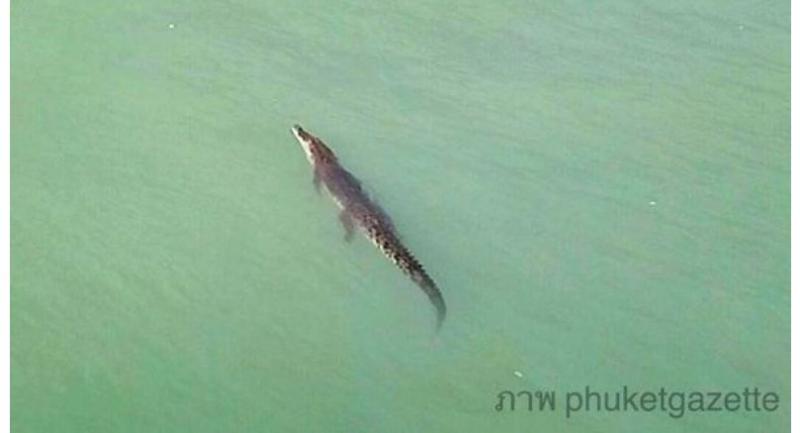Phuket’s captured croc sets off debate about tourism and wildlife

A three-metre-long saltwater crocodile found swimming off a beach on the resort island of Phuket last week, which is now in captivity after being caught last Friday, has become the unwitting talk of the town regarding maritime safety and its own immediate future.
Tourists have been warned to stay out of the water at Phuket’s northern beaches after the reptile was spotted in the sea on August 28.
The crocodile, which is believed to be male, was spotted at Mai Khao Beach and a tourist used a drone to take photos to prove its presence at the beach, which is heavily populated with hotels, resorts and tourists.
The photos of the crocodile at the busy beach subsequently hit the headlines in both the local and international media.
The attention led to the capture of the reptile last Friday and its transfer to a holding tank at a fishery centre in Thalang district last Friday, but the story did not end there.
Many members of the public have since taken to online media to make their opinions known after Phuket Governor Norraphat Plodthong took an interest in the animal, telling local media that the Fisheries Department would decide whether relevant authorities would provide care for it, possibly at an aquarium or zoo.
Although it is still unclear whether the animal had escaped from captivity or was raised in the wild, people have clamoured for its “return” to nature, including on the public advocacy website change.org, with 5,463 people signing a petition of support as of yesterday afternoon.
The public concern reached a crescendo after the media reported that the crocodile was refusing to eat, signalling that it was feeling stress in captivity, with animal lovers expressing their opinions on social networks, saying the site where it had been found was its habitat, which humans had encroached upon.
Sasin Chalermlarp, president of the Seub Nakhasathien Foundation conservation group, proposed that the crocodile be moved to a new location before it is returned to nature.
Rangsarit Kanjanavanit, a member of the same foundation, said the crocodile should not have been captured in the first place, adding that it could live harmoniously with humans. “It’s important to preserve this rare saltwater crocodile and let it live freely. It should be released back to the sea as soon as possible.”
Thon Thamrongnawasawat, a noted marine biologist, said there should be a serious discussion about the reptile’s safety before it is released into nature. “It would not be good if the crocodile is killed after returning to the sea.”
